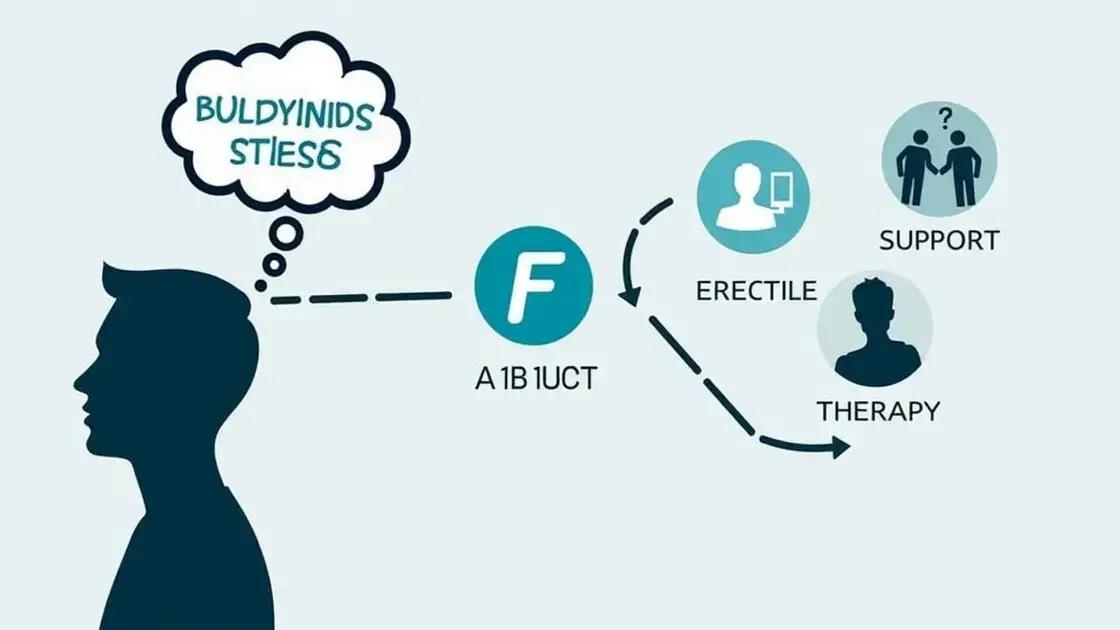The connection between erectile dysfunction (ED) and anxiety disorders is significant, as anxiety can exacerbate ED symptoms, leading to a cycle of stress and performance anxiety. Effective treatment options include medications, therapy, lifestyle changes, and strong support systems involving open communication with partners and healthcare professionals.
The connection between erectile dysfunction (ED) and anxiety disorders is a complex issue that affects many men today. ED can often stem from psychological factors, including anxiety, which can create a challenging cycle of fear and performance issues. As we delve into the intricate relationship between these conditions, consider how understanding this connection might pave the way for effective treatments and support. This article will explore the definitions of erectile dysfunction, the psychological impacts of anxiety disorders, available treatment options, and how men can seek the assistance they need.
Understanding Erectile Dysfunction

Erectile dysfunction (ED) is a common condition that affects many men at different stages of life. ED is defined as the inability to achieve or maintain an erection sufficient for satisfactory sexual performance. This issue can stem from various factors, both physical and psychological. Understanding the causes and implications of ED is an essential step towards addressing it effectively.
Causes of Erectile Dysfunction
There are several underlying causes of erectile dysfunction. Physical causes can include medical conditions such as diabetes, heart disease, and high blood pressure. These conditions can affect blood flow or nerve function, leading to difficulties in achieving an erection. Psycho-emotional factors such as stress, depression, and anxiety also play a significant role in erectile dysfunction.
Impact on Life
ED can profoundly impact a man’s quality of life. It can lead to feelings of embarrassment, low self-esteem, and frustration. Furthermore, it can strain intimate relationships, causing partners to feel disconnected. This cycle of negative feelings can exacerbate the condition, making it even more challenging to overcome.
Understanding Diagnosis
To diagnose ED, healthcare providers typically conduct a physical exam and review medical history. Tests may be performed to determine the cause of erectile dysfunction, including blood tests, urine tests, or ultrasound studies. It’s important for men to seek professional help if they experience these symptoms, as early diagnosis can lead to effective treatment.
Moving Forward
While many men may feel reluctant to discuss erectile dysfunction, addressing the issue is vital for health and wellbeing. Whether the cause is physical or psychological, there are various treatment options available to help restore erectile function and improve one’s overall quality of life.
The Role of Anxiety Disorders

Anxiety disorders can significantly influence a man’s sexual health, including the occurrence of erectile dysfunction (ED). These disorders often lead to heightened levels of stress and worry, which can interfere with normal sexual function. Men with anxiety may experience performance anxiety, making them preoccupied with the fear of not being able to perform sexually.
Types of Anxiety Disorders
Several types of anxiety disorders can affect men, including generalized anxiety disorder (GAD), social anxiety disorder, and panic disorders. Generalized anxiety disorder involves excessive worry about various aspects of life, which can spill over into sexual performance. Social anxiety disorder can cause men to fear judgment in social situations, leading to stress during intimate moments.
Impact on Erectile Function
When anxiety strikes, it can affect the brain’s ability to send messages that cause an erection. This can lead to a vicious cycle; as anxiety increases, erectile dysfunction may worsen, which in turn exacerbates anxiety. Men often become fixated on past experiences of failure, causing an overwhelming amount of pressure during sexual encounters.
Physical Symptoms of Anxiety
Besides emotional stress, anxiety can produce physical symptoms that further complicate sexual performance. These may include increased heart rate, sweating, and muscle tension. Such symptoms can lead to distraction during intimate moments, making it even more difficult to achieve or maintain an erection.
Seeking Help
Recognizing the role that anxiety disorders play in erectile dysfunction is the first step to finding help. Men need to understand that they are not alone and that seeking professional support can help manage both anxiety and ED effectively. Whether through therapy or medical treatments, addressing the connection between these two issues is crucial for restoring sexual health.
Psychological Impacts on ED

The psychological impacts of erectile dysfunction (ED) are profound and can affect various aspects of a man’s life. Emotional well-being can take a hit as feelings of inadequacy and embarrassment arise. Many men may not discuss their difficulties, leading to feelings of isolation and shame.
Effects on Self-Esteem
ED can lead to a significant drop in self-esteem. Men may start to feel less masculine or worry that they are no longer attractive to their partners. This drop in confidence can have far-reaching effects, including avoidance of intimate situations, which compounds the problem.
Relationship Strain
When a man struggles with ED, it can create tension in relationships. Partners may feel distressed or rejected, while men may withdraw from intimacy out of fear of failure. This dynamic can lead to misunderstandings and resentment, making communication and closeness more difficult.
Increased Anxiety
The psychological strain from ED can intensify anxiety issues. Performance anxiety becomes a significant factor, and men may begin to dread sexual encounters due to fear of not being able to perform. This creates a vicious cycle where anxiety contributes to ED, and ED increases anxiety.
Link to Other Mental Health Issues
Many men experiencing ED also face other mental health challenges, such as depression. Depression can further exacerbate issues with sexual function, making it essential to address both problems simultaneously. The intersection of these conditions can leave men feeling overwhelmed.
Importance of Communication
Open communication is vital in dealing with the psychological aspects of ED. Talking to partners about feelings and struggles can help strengthen relationships and reduce feelings of loneliness. Moreover, seeking professional help can provide strategies to cope with the emotional fallout of ED.
Treatment Options for ED and Anxiety

Treating erectile dysfunction (ED) and anxiety requires a comprehensive approach that addresses both physical and psychological aspects. Understanding the available treatment options is essential for men seeking relief and improvement. There are several effective strategies that can provide help.
Medical Treatments for ED
One of the most common treatments for ED includes oral medications known as PDE5 inhibitors. These medications, such as Viagra and Cialis, help increase blood flow to the penis, making it easier to achieve an erection. Consulting with a healthcare provider is essential to determine if these options are suitable and safe.
Counseling and Therapy
Addressing psychological factors through therapy can be very effective. Cognitive-behavioral therapy (CBT) focuses on changing negative thought patterns that contribute to anxiety and ED. This type of therapy can help men develop coping strategies and reduce performance anxiety. Couples therapy may also be beneficial to improve communication and intimacy between partners.
Lifestyle Changes
Making healthy lifestyle choices can significantly impact both anxiety and ED. Regular exercise, a balanced diet, and maintaining a healthy weight can improve physical health and contribute to better sexual function. Additionally, reducing alcohol consumption and quitting smoking can enhance overall well-being and sexual performance.
Stress Management Techniques
Practicing stress management techniques is vital for those dealing with anxiety. Meditation, yoga, and deep-breathing exercises can help alleviate anxiety symptoms and promote relaxation. Incorporating these practices into a daily routine can lead to a calmer mindset, which can positively influence sexual health.
Alternative Treatments
Some men may explore alternative treatments, such as acupuncture or herbal supplements, to address their ED. It is crucial to discuss these options with a healthcare provider to ensure safety and effectiveness. Alternative therapies should not replace standard medical treatments, but may complement them when managed properly.
Seeking Help and Support

Seeking help and support is crucial for men dealing with erectile dysfunction (ED) and anxiety disorders. It is essential to recognize that these issues do not have to be faced alone. Support can come from many avenues, whether it’s professional help or talking to friends and family.
Consulting Healthcare Professionals
The first step in seeking help is to consult a healthcare provider. Doctors can offer guidance, diagnose underlying conditions, and suggest treatment options. They can also refer men to specialists, such as urologists or mental health professionals, depending on individual needs.
Therapy and Counseling
Therapy can be beneficial for those facing emotional challenges due to ED or anxiety. Talking to a therapist or counselor can help men express their feelings. Therapists can provide coping strategies and tools to manage anxiety-related issues and work on self-esteem and body image concerns.
Support Groups
Joining a support group can connect men with others who share their experiences. Support groups offer a safe space to share thoughts and feelings. Hearing from others can reduce feelings of isolation and provide valuable insights into managing similar issues.
Communicating with Partners
Open communication with partners is vital. Discussing feelings, fears, and experiences can enhance intimacy and understanding. Partners can offer emotional support and encouragement, helping to alleviate stress associated with both ED and anxiety.
Online Resources
Several online resources and forums provide information and community support for those dealing with ED and anxiety. These platforms can offer helpful articles, videos, and a place to ask questions. However, it’s essential to differentiate between reliable sources and those that may not be scientifically backed.
Understanding the Connection Between ED and Anxiety
The connection between erectile dysfunction (ED) and anxiety disorders is complex and multifaceted. Recognizing how these issues interact is essential for effective treatment and support.
By understanding the psychological impacts, exploring various treatment options, and seeking help from healthcare professionals, friends, and support groups, men can navigate through these challenges. Open communication with partners also plays a critical role in maintaining intimacy and reducing anxiety.
With the right strategies and support systems in place, men can reclaim their sexual health and emotional well-being. The journey may take time, but understanding and addressing both ED and anxiety can lead to lasting improvements in quality of life.
FAQ – Frequently Asked Questions about Erectile Dysfunction and Anxiety
What is erectile dysfunction (ED)?
Erectile dysfunction (ED) is the inability to achieve or maintain an erection sufficient for satisfactory sexual performance.
How do anxiety disorders affect ED?
Anxiety disorders can lead to increased stress and performance anxiety, negatively impacting sexual function and contributing to ED.
What treatment options are available for ED and anxiety?
Treatment options include medication, therapy, lifestyle changes, and support from healthcare professionals and support groups.
Is it important to seek help for ED and anxiety?
Yes, seeking help from healthcare providers and mental health professionals is crucial for addressing both ED and anxiety effectively.
Can lifestyle changes improve ED and anxiety symptoms?
Absolutely. Regular exercise, a balanced diet, stress management techniques, and reducing alcohol intake can all positively affect ED and anxiety.
How can partners support each other in dealing with ED and anxiety?
Open communication and understanding are key. Partners can provide emotional support, help alleviate stress, and work together to find solutions.













